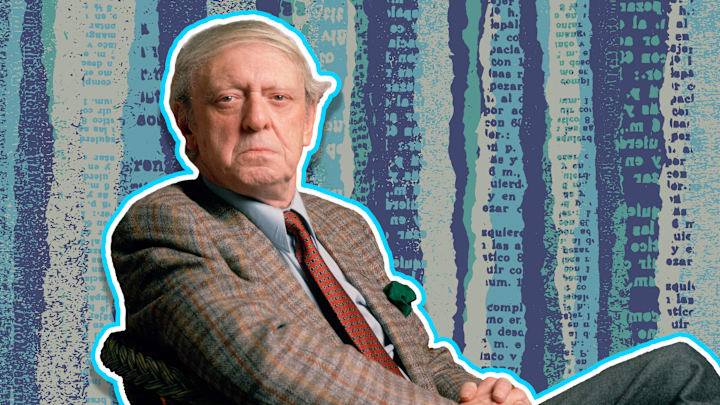Fans of Anthony Burgess know that the famed English author loved playing with language. While writing his seminal novel A Clockwork Orange (1962)—which director Stanley Kubrick later adapted into a 1971 film—Burgess invented a teenage slang called Nadsat, which he peppered with anglicized Russian words. And more than 20 years after Burgess’s death, archivists in Manchester, England, rediscovered another sign of his fascination with words: an unfinished slang dictionary.
First commissioned by Penguin Books in 1965, the dictionary contains several hundred entries. The International Anthony Burgess Foundation—an educational charity in Burgess’s birth city of Manchester that celebrates the author’s career and life—rediscovered the work among the author’s personal objects, at the bottom of a box containing old bed sheets.
Working on the dictionary was both time-consuming and linguistically challenging, so Burgess abandoned the project instead of completing it as a full-length reference work. “I’ve done A and B and find that a good deal of A and B is out of date or has to be added to, and I could envisage the future as being totally tied up with such a dictionary,” the author said in a 1971 interview (he seemingly forgot that he had also done some work on entries for the letter z). “So I’m dropping the whole project. Leave it to Eric Partridge,” the lexicographer who authored works like A Dictionary of the Underworld and A Dictionary of Catch Phrases.
What remained of the endeavor were hundreds of 6x4-inch slips of paper, on which Burgess had typed each entry. Examples include abdabs (“fit of nerves, attack of delirium tremens, or other uncontrollable emotional crisis”) and abortion (“anything ugly, ill-shapen, or generally detestable”).
The work offers insight into Burgess’s interest in language, and tells us about his life experiences. But it’s simply not a great dictionary, according to slang lexicographer Jonathon Green.
“Terms like ‘writer’s block’ are not slang,” Green, who has teamed up with the Burgess Foundation to analyze the work, told The Guardian. “Proper names like the Beatles are not slang. Meanwhile, one cannot, as in ‘arse’, begin a definition with the statement ‘I need not define.' Nor throw in personal assessments (‘Arse is a noble word; ass is a vulgarism’).”
Green theorized that Burgess may have realized that he was in over his head, and chose to abandon the project instead of setting himself up for failure. “Slang is a very slippery customer,” Green concluded. “I get the feeling that Burgess thought it was much easier than it actually is … Smart as he was, with an understanding of linguistics and language, I don’t think he could have allowed himself to do a second-rate [dictionary]. If he didn’t stop everything else, that’s what he would have turned out with.”
Now that you know about Burgess’s incomplete slang dictionary, read about his favorite dystopian novels and why he hated the movie version of A Clockwork Orange.
A version of this story ran in 2017; it has been updated for 2023.
